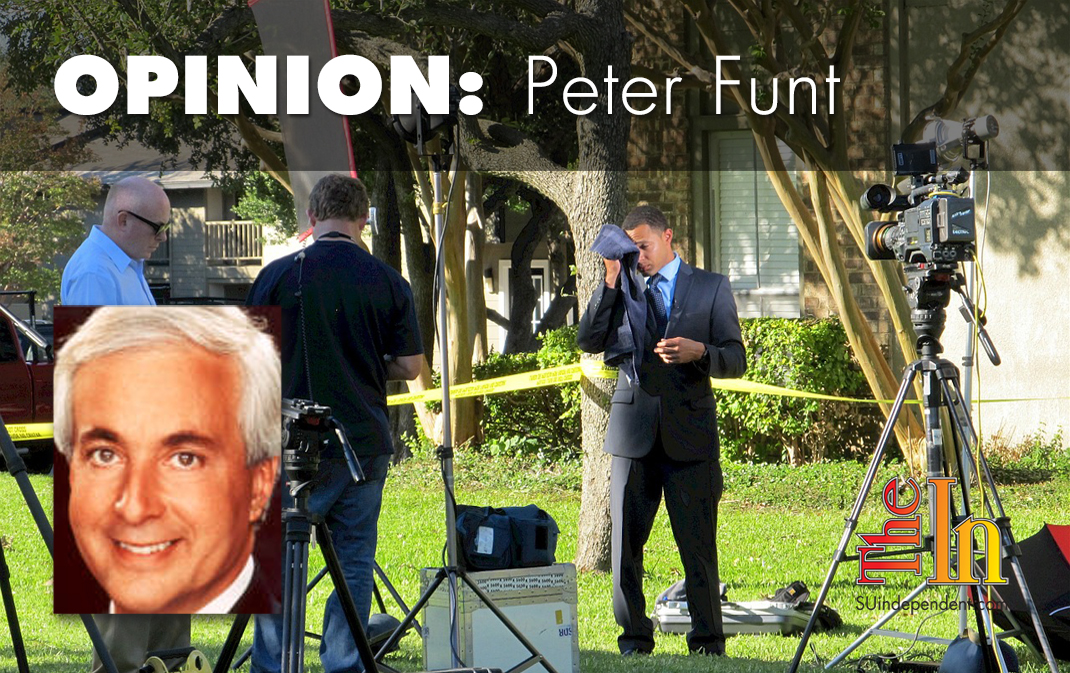
Politicians are running for TV jobs
By Peter Funt
The snide old saw in college used to be “If you can’t make it in business, teach it.” In media today, it’s become “If you can’t make it in politics, preach it.”
Republican Jeff Flake, who declined to seek reelection as a senator from Arizona and recently abandoned the notion of challenging Donald Trump for the presidency, turned up recently in his new post as contributor at CBS News. Meanwhile, Democrat Andrew Gillum, the former Tallahassee mayor who narrowly lost his bid to become Florida’s governor, took a seat as a commentator at CNN.
Back in the day, vanquished politicians retired to a cabin by the lake to think deep thoughts and write memoirs. But for the new crop of articulate, photogenic, and somewhat younger also-rans, the path of least resistance — and a guaranteed paycheck — often leads to the TV studio.
Utah’s renegade Republican Mia Love, who lost her House seat, ran over to CNN last month, tweeting that she will offer an “unleashed perspective.” Another Utah Republican, former Rep. Jason Chaffetz, took a gig at Fox News. He was joined at Fox last month by retired South Carolina congressman Trey Gowdy.
When Love arrived at CNN she sat alongside Democrat Louis Gutierrez of Illinois, who retired from Congress. Missouri Democrat Claire McCaskill, defeated in her Senate re-election bid, signed on at NBC News.
Clearly, for many politicians the road to the news desk is proving less difficult to travel than the road to the White House or to Capitol Hill.
Networks are staffing up for what will be roughly 600 straight days of analysis about the 2020 election. Cable channels in particular need articulate commentators, since the big three — Fox, CNN, and MSNBC — all fill vast amounts of airtime with talking heads.
What they learned in the 2016 campaign was that finding a mix of compelling opinions was difficult. On CNN, for example, Kayleigh McEnany, who had held a few minor, non-elected political jobs and was still in her 20s, was called upon to represent the conservative side in heated debates with a panel of largely liberal pundits. McEnany was out of her depth and resigned after the election.
CNN fared much better by hiring a polished pol, former Pennsylvania Senator Rick Santorum, in 2017. Santorum has provided calm, reasoned analysis on the panel — the very thing CNN is now seeking by opening its door to other former office-holders.
Of course, politicians taking TV posts isn’t new. Sarah Palin tried it on Fox and failed while Joe Scarborough did it on MSNBC and has been quite successful.
But never in political or broadcasting history have so many former elected officials signed up for TV duty. For one thing, the leap to television isn’t as difficult as it used to be. Nowadays, slapping on makeup, finding the red light on your camera, and speaking in manageable sound bites is routine.
Moderate Republican John Kasich, the former Ohio governor, probably knows as much about shuttling between politics and media as anyone. After serving 18 years in Congress, Kasich flirted with running for president in 2000 but decided against it and went to work for Fox News as a commentator and fill-in host.
He stepped away from that gig in 2009 to run for governor and served two terms, the second of which ended just last month. A few days later Kasich reported for work as a commentator at CNN.
Unlike most in TV’s new crop of pundits, however, Kasich says he hasn’t ruled out running for president in 2020. His agency, UTA, issued a statement saying that Kasich’s CNN post would “help him navigate the next phase of his public and private life.”
Really? A TV performer running for president? What are the odds of that?
The viewpoints expressed above are those of the author and do not necessarily reflect those of The Independent.
How to submit an article, guest opinion piece, or letter to the editor to The Independent
Do you have something to say? Want your voice to be heard by thousands of readers? Send The Independent your letter to the editor or guest opinion piece. All submissions will be considered for publication by our editorial staff. If your letter or editorial is accepted, it will run on suindependent.com, and we’ll promote it through all of our social media channels. We may even decide to include it in our monthly print edition. Just follow our simple submission guidelines and make your voice heard:
—Submissions should be between 300 and 1,500 words.
—Submissions must be sent to editor@infowest.com as a .doc, .docx, .txt, or .rtf file.
—The subject line of the email containing your submission should read “Letter to the editor.”
—Attach your name to both the email and the document file (we don’t run anonymous letters).
—If you have a photo or image you’d like us to use and it’s in .jpg format, at least 1200 X 754 pixels large, and your intellectual property (you own the copyright), feel free to attach it as well, though we reserve the right to choose a different image.
—If you are on Twitter and would like a shout-out when your piece or letter is published, include that in your correspondence and we’ll give you a mention at the time of publication.



